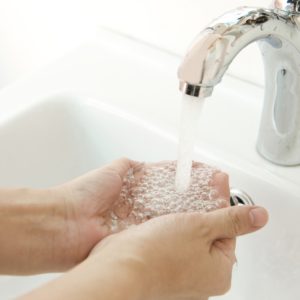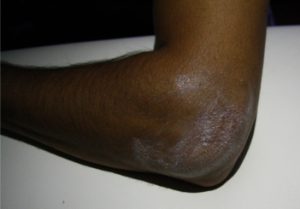Eczema Care Online is for people with eczema and families caring for a child or baby with eczema.
Eczema Care Online is for people with eczema and families caring for a child or baby with eczema.
This information is important for everyone with eczema. Even if you’ve been looking after your child’s eczema for a while, you may find some new, helpful tips.
This section will look at;

Flare control creams are used to get control of eczema flare-ups. They contain medicines to make the skin less sore and itchy. This helps the skin heal. Most people with eczema will need to use flare control creams at some point.
"I didn't think I would learn anything new as I've been dealing with his eczema since he was a baby but I found out some things I didn't know."
EmilyThese creams usually topical corticosteroid creams or ointments (often called steroid creams). Sometimes people are prescribed other medicated creams. We mention these later.
Steroid creams are the most common type of flare control creams
"When the back of his knees flare-up, I put the steroid cream on and it clears it right up."
AliYes. When steroid creams are used correctly they are very safe, even in babies and young children. They will help you to quickly get control of your child’s eczema.
Although they are safe to use, we know that families sometimes worry about the side-effects of steroid creams. Here are some common questions that families have about steroid creams. Click the questions you want to find out more about.
If you are not sure about whether your child needs flare control creams, or if you have never been prescribed these before but think your child needs them, then speak to your doctor about this.
It is important that you use flare control creams as prescribed. For most people, this will be: Once a day during a flare-up and continue until the skin feels smoth and is itch free.
Many families are not sure about how much flare control cream to put on their child. As a rough guide, put on a generous layer, enough to cover the eczema flare area.
Sometimes people use more flare control cream to try to make eczema go away quicker. Studies show that using flare control creams once a day when you need them is just as effective as more often.
Some people use too little flare control cream. This is not better for your skin and the creams will not work well like this. It may mean you need to use more in the long-run.
It is a good idea to wash your hands – they may have bacteria on them that could make your child’s flare-up worse or get infected.
Use downward strokes, in the same direction that the hair is growing. Do not rub it in, as rubbing can make the skin feel itchy.
Put a generous lay of cream on the areas that have flared up.
It is safe to put steroid creams on broken skin. This may sting at first, but this will stop as the skin heals.
Wash the cream off your hands when you have finished.

Use downward strokes, in the same direction that the hair is growing. Do not rub it in, as rubbing can make you feel itchy.
Put a generous layer of cream on the areas that have flared-up.
It is safe to put steroid creams on broken skin. This may sting at first, but this will stop as the skin heals.

Wash the cream off your hands when you have finished, unless you have hand eczema. This is because flare control cream should only be used on the areas that need it.
Yes. You will need to carry on using moisturising creams every day to keep control of your child’s eczema. This will help soothe the skin and prevent other flare-ups. Click the boxes for answers to some common questions about using moisturising creams and flare control creams together.
There are different types and strengths of flare control cream that you can use for your child’s eczema. It can feel frustrating when eczema isn’t getting better even when you are using the treatments as you’ve been told to. This section looks at how you can find a flare control cream that is right for your child. This will usually be a steroid cream. Click the topics you want to find out more about.
These creams are used to get control of eczema. They are:
Most people with eczema will need to use flare control creams at some point.
Use them as soon as there is a flare-up.
During a flare-up, apply generously to the affected skin once a day until the eczema is under control. Your doctor will tell you if you need to do this more often.
Apply generously to all the areas of the skin affected by eczema, not just the worst areas.
Use them until the skin feels smooth and itch free and the eczema is under control. Speak to your doctor or nurse if you are moisturising daily and using the flare control cream as directed and there is still no improvement after 2-4 weeks.
Yes. Studies show that flare control creams are safe when used following the instructions above. They should be applied to the affected skin only.